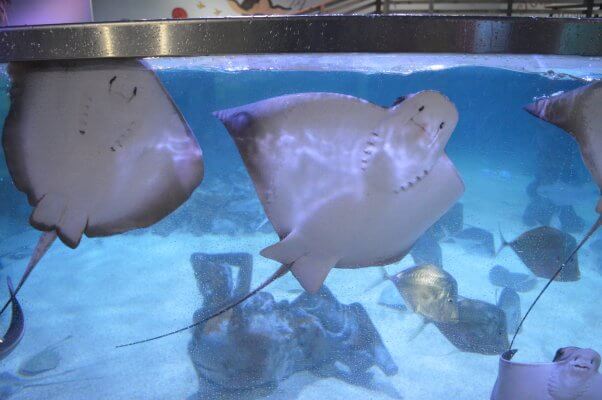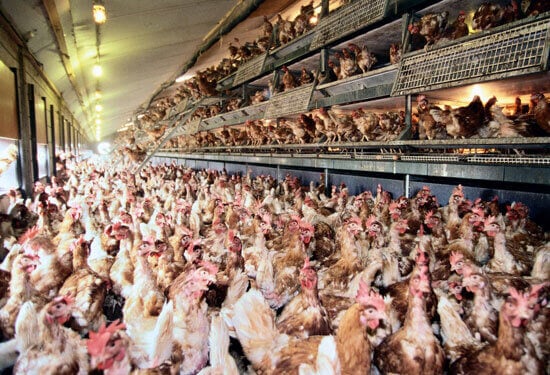23 Examples of Euphemisms About Animals
As more and more people strive to make humane choices, industries and others that abuse animals have their spin doctors hard at work. From “cage-free eggs” to “nontarget animals” and from “humane meat” to “no-kill,” here are some examples of animal-related euphemisms that might have fooled you.
Examples of Euphemisms That Are Fooling You
- “Positive reward training” is the only kind of training that our canine companions should ever have. But according to Ric O’Barry, when you hear marine animal “trainers” refer to “positive reward training,” you can bet that what they really mean is “food deprivation.”
- There is no such thing as a “reputable breeder.” When your “hobby” is making money by bringing more animals into a world that has no place for them and killing other animals’ chances at finding a home, you seriously need a new pastime.
- “Petting pools” and “touch tanks” are cute-sounding phrases used to describe the shallow concrete tanks in which aquariums force animals to submit to being touched, grabbed, and poked by humans.

- The next time you see the words “Persian wool,” think of what Stella McCartney compared it to: “wearing a fetus.” Also called “Karakul lamb fur” or “Astrakhan,” “Persian wool” comes from lambs who were torn away from their mothers and killed right after birth—or from fetuses whose mothers were killed when their due dates were near.
- “Riding crop” may conjure up images of Fifty Shades of Grey, but for Thoroughbred horses who are whipped by jockeys to force them into running even faster, it’s all pain and no pleasure.
- Animal agriculture’s favorite new buzzword is “humane meat.” But as numerous eyewitness investigations have proved, “humane meat” can only be called “marginally less cruel meat” at best.
- Hunters love to steal the word “conservation” from people who truly care about protecting animals and preserving the environment. But their form of “conservation” involves ensuring an increase in whatever “target” species they like to hunt—for example, building up a population of deer and then decimating it because “there are too many of them” (after they’ve killed off the deer’s other predators).
- A more accurate phrase for the angler favorite “catch-and-release” might be “impale-suffocate-chuck.”
- “Cage-free eggs” from a severely crowded, filthy warehouse littered with the bodies of dead hens and bird poop, anyone?

- In Australia, which produces more than 50% of the world’s merino wool, lambs endure a gruesome procedure with a charming name. “Mulesing” involves carving chunks of skin and flesh from their backsides, often without painkillers.
- Ninety percent of large fish populations have been exterminated in the last 50 years. That’s why the only “sustainable seafood” is tasty plant-based faux fish.
- “Declawing” should really be called “deknuckling” because it involves removing whole digits at the joints, not just the nails. People who have their cats “deknuckled” and veterinarians who do it for them deserve to get clawed.

- When fur trappers say “leghold trap,” they really mean “leg-crushing trap.”
- “Game animals” is a hunter’s favorite way of saying “the ones whose heads I want to hang on my wall.” For the animals, though, it’s no game.
- What does “free-range” really mean? A lot of things, actually, including that the animals are confined to muddy, feces-filled lots or filthy warehouses; debeaked, dehorned, or castrated like animals in other facilities; and sent to the same slaughterhouses as other animals.
- And what about “organic”? That sounds wholesome, but “organically raised” animals are denied medication, even when they get sick, such as when cows used for milk develop painful udder infections.
- “There is no such thing as a hypoallergenic dog breed,” reports the Mayo Clinic. “Hypoallergenic dogs” still shed, shake, scratch, and do all sorts of other things that release dander. They also rake in plenty of money for breeders who gouge the Benadryl set.
- Foie gras farms use the fancy French word “gavage” for the ugly practice of ramming a metal tube down the throats of geese and ducks to pump them full of grain.
Euphemisms Masking Death
- While there are many euphemisms for death that help make an uncomfortable topic less scary to us, animal-abusing industries love to use alternative terms to disguise the places where animals endure a violent death: “Processing plant” has a much nicer ring to it than “slaughterhouse” or “building in which animals are skinned, scalded to death, and hacked apart—sometimes while they’re still conscious.”

- Since the word “kill” sounds too, well, deadly, hunters prefer euphemisms for death such as “harvest.” But you don’t have to be a farmer to know that picking apples and gunning down animals are two different things.
- “Live tissue training” is military code for injuring and killing animals in cruel battlefield training exercises.
- Commercial fishing enterprises like the euphemism “nontarget animals” because, to the untrained ear, it sounds as though the animals are safe. What they’re really referring to are the sharks, dolphins, sea turtles, whales, birds, seals, and porpoises who are caught by accident and die in fishing nets.
- And what gets our vote for the most widely used and most deceptive euphemism of all? “No-kill.” “No-kill” shelters could more accurately be called “slow-kill” or “turn-away” shelters. Taking in only the youngest, cutest, and most easily adoptable animals and turning the rest away, “no-kill” shelters are the elitists of the animal welfare world. People who truly care about animals give their donations to open-admission shelters, which offer solace to every animal who comes through their doors.
Ditch the Euphemisms and Go Vegan
With so many confusing euphemisms used for death and cruelty, the best way to make sure that you don’t fall for pleasant-sounding phrases that mask harm to animals is to stop supporting the industries that use them. Take our 3-Week Vegan Challenge today!

